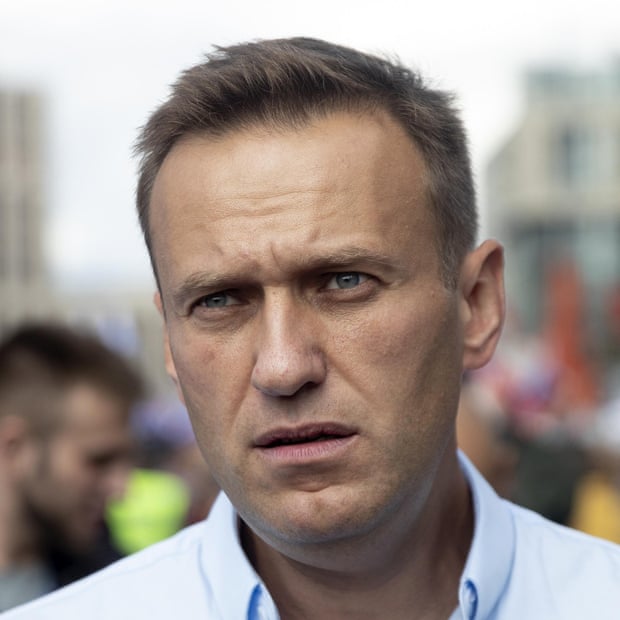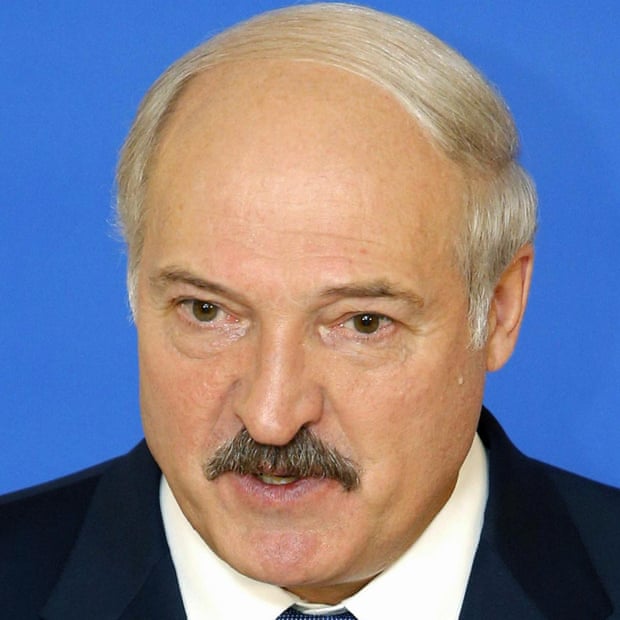
[ad_1]
The president of Belarus, Alexander Lukashenko, has claimed that his security forces intercepted German calls showing that the Kremlin foe Alexei Navalny’s poisoning was faked.
Lukashenko told the visiting Russian prime minister, Mikhail Mishustin, in Minsk that the call between Berlin and Warsaw showed that the incident was a “falsification”.
“There was no poisoning of Navalny,” Lukashenko told a poker-faced Mishustin during their televised meeting. “They did it – I quote – in order to discourage [Russian president Vladimir] Putin from sticking his nose into Belarus’s affairs.”
Profile
Who is Alexei Navalny?

Born in 1976 just outside Moscow, Alexei Navalny is a lawyer-turned-campaigner whose Anti-Corruption Foundation investigates the wealth of Vladimir Putin’s inner circle.
He started out as a Russian nationalist, but emerged as the main leader of Russia’s democratic opposition during the wave of protests that led up to the 2012 presidential election, and has since been a thorn in the Kremlin’s side.
Navalny is barred from appearing on state television, but has used social media to his advantage. A 2017 documentary accusing the prime minister, Dmitry Medvedev, of corruption received more than 30m views on YouTube within two months.
He has been repeatedly arrested and jailed. The European court of human rights ruled that Russia violated Navalny’s rights by holding him under house arrest in 2014. Election officials barred him from running for president in 2018 due to an embezzlement conviction that he claims was politically motivated. Navalny told the commission its decision would be a vote ‘not against me, but against 16,000 people who have nominated me; against 200,000 volunteers who have been canvassing for me‘.
There has also been a physical price to pay. In April 2017, he was attacked with green dye that nearly blinded him in one eye, and in July 2019 he was taken from jail to hospital with symptoms that one of his doctors said could indicate poisoning. In 2020, he was again hospitalised after a suspected poisoning, and taken to Germany for treatment. The German government later said toxicology results showed Navalny was poisoned with a Novichok nerve agent.
Lukashenko provided no further details but said he would hand over transcripts to Russia’s security services.
The authoritarian, longtime Belarusian leader is under huge pressure from opposition protesters demanding his resignation after a disputed presidential election on 9 August.
Tens of thousands of people have taken to the streets for weeks in unprecedented protests against Lukashenko’s 26-year rule.
The claim about Navalny could be aimed at currying favour with Moscow, which has voiced support for Lukashenko during the protests.
Profile
Who is Alexander Lukashenko?

Born in August 1954 in Kopys, Belarus, Alexander Lukashenko has served as president of Belarus since the establishment of the office in July 1994. On his initial election, Lukashenko set about establishing an effective dictatorship, sustained by shamelessly rigged elections.
Over the years, Lukashenko has offered his people a sort of Soviet-lite system that prizes tractor production and grain harvests over innovation and political freedoms, and the key part of his political offer has always been political and economic stability.
Lukashenko tried to push this line again into the run-up to 2020’s disputed presidential vote, painting Belarus as an island of stability in a world buffeted by economic crises, political unrest and coronavirus. But the scale of discontent has shown that for many Belarusians, this messaging will no longer work.
The 2020 elections have been described as the deepest crisis he has faced in his career, and in order to secure his supposedly crushing victory, Lukashenko required what appears to be some of the most brazen vote-rigging in recent European history. He appears to have subsequently forced his main opponent, Svetlana Tikhanovskaya, into exile.
After the election, in a congratulatory message, Vladimir Putin urged Lukashenko to consider further economic and legal integration with Russia, which the opposition has warned would undermine Belarus’s sovereignty.
The man sometimes described as “Europe’s last dictator” may have engineered a sixth term in office, but the balance of power has shifted away from him in a way few would have thought possible even a month ago. The EU has said it does not recognise his election, and mass protests against his rule have continued in Belarus.
Navalny’s top aide, Leonid Volkov, dismissed the claim as ridiculous, accusing the Russian prime minister of being an accomplice to the “attempted murder” by playing along in “this circus”.
Germany said on Wednesday that tests had proven Navalny was poisoned with novichok, after he fell ill on a plane in Siberia last month and was eventually taken to Berlin for treatment.
Navalny, 44, remains in an artificially induced coma but his condition is improving, according to his German doctors.
Lukashenko and Mishustin also said the two sides had made progress on plans to bring Russia and Belarus closer.
In recent years the Kremlin has pushed for closer economic and political integration between former Soviet countries but Lukashenko has so far resisted an outright unification.
Lukashenko and Putin are set to meet in Moscow in the next few weeks.
[ad_2]
Source link